- Home
- T. Kingfisher
The Wonder Engine Page 2
The Wonder Engine Read online
Page 2
Caliban pinched the bridge of his nose and told himself that the scholar was trying his best. The Many-Armed God, who Learned Edmund followed, was known for producing brilliant, sheltered scholars, all of whom were sworn to celibacy and most of whom had not seen a woman since they were dedicated to the temple at the age of five.
“But Mistress Slate is not typical, I expect.”
The paladin barked a laugh. “Typical! I no longer know what is typical of anyone. But I have generally found that women are capable of great heroism. At least as great as men.” He thought of the nuns who had raised him and added, “And they frequently make less fuss over it.”
Learned Edmund was clearly skeptical. “Well,” he said. “I have met very few, of course.”
“You might try meeting more.”
“The Many-Armed God teaches us to avoid distractions.”
Caliban had a brief, vivid memory of one of the older nuns saying: “Maybe their god could use one of those arms to pull his followers’ heads out of their own asses!”
He missed nuns. You always knew where you stood with nuns.
He reminded himself that Learned Edmund had come a long way in a few weeks.
“You might consider how much knowledge you’re missing by avoiding them.”
Learned Edmund’s nostrils flared. “I will think on it,” he said finally. Caliban rubbed his temples and thought uncharitable thoughts.
Grimehug glanced over at him, ears half-cocked. He could not read the gnole’s expressions well, but he thought it was amusement, and something else as well.
He did not quite trust Grimehug, and yet he found himself being grateful.
There had been a moment, in that flight from the rune, when Caliban had almost forgotten himself. When Slate had been limping and he had tried to be her crutch, the way he would have for Learned Edmund or Brenner or anyone else.
He had slid his shoulder under her arm and she had pressed against his side, breast and hip and thigh. And her face had been too close and he could smell her suddenly, under the sweat and the blood and the tang of pine needles. And his stupid body, still dazed by the rune-demon’s attempt at seduction, had roused again.
For a half-dozen heartbeats, he’d imagined taking her right there, up against a tree, and both their wounds be damned. Hard and fast until she cried out his name and he forgot that there had ever been a demon that wore her face.
Then Grimehug had pulled at him and said, “Too tall, big man. Let a gnole try,” and Slate had slipped off his shoulder and braced herself on the little badger-creature instead.
The gnole had given him a look as they traded places. Just a brief one, with his lip curled up over one fang. Not a threatening look, but Caliban had a strange, unsettled feeling that Grimehug had known exactly what he was thinking.
It had been like a splash of cold water. No. Of course not. Even if Brenner and Grimehug hadn’t been standing right there, his hands were still covered in the old shaman’s blood. For the love of the Dreaming God, how could he, even for a moment, have imagined doing that?
“Sorry?” said Learned Edmund. “I didn’t catch that.”
“Beg pardon?”
“You said something about Mistress Slate.”
Caliban shook his head. “Sorry. Wool-gathering.”
He glanced at Grimehug, and saw that the gnole was watching him again, thinking gods-knew-what behind those yellow eyes.
Caliban could feel a headache coming on.
Even had they been in private and somewhat less blood-covered, Caliban suspected that he’d blown his chance with Slate sometime earlier. She had rescued him and then he had rescued her, and it should have worked out somehow, but instead he’d opened his damn mouth and started babbling nonsense about the strong protecting the weak.
The memory made him cringe. He couldn’t even blame the demon. That had been purely human stupidity, nothing more.
Frankly, after that little display, it was a miracle Slate had come back to rescue him from the rune at all.
Well, you had Brenner with you. She was probably rescuing him.
Brenner, who was ruthless and sarcastic and killed people for a living and who made no bones of the fact that he didn’t trust Caliban any farther than he could throw the paladin in full armor.
Brenner, who had been Slate’s lover once, and definitely wouldn’t mind filling that position again.
And if I had an ounce of sense, I’d get out of his way. She is my commander and my liege and that is all that I have any right to ask of anyone.
…I do not seem to have much sense.
The way that they had spoken together, almost with their own private language, filled him with gnawing envy. Brenner understood that part of Slate’s life in a way that the paladin never could.
Envy is a terrible emotion for a paladin. Nearly as bad as pride.
“Twisting your own whiskers, big man,” said Grimehug.
Caliban opened his eyes. “Hmm?”
“You. Thinking. Smells like whisker twisting.”
“I suppose I am.”
“Humans don’t have whiskers,” said Learned Edmund. “Does this denote a painful act?”
Grimehug gave him a dubious look. “Hurts, yeah. But a gnole does it sometimes anyway. Knows a gnole should stop, but keeps twisting. You know?”
“I know,” said Caliban. “Believe me, I know.”
“Thought you might, big man.”
Forty-five minutes and a subjective eternity later, Slate and Brenner returned. “This way,” said Slate.
The inn she had found was expensive and exclusive, and there was no question about them taking gnoles. But it was expensive enough to have a garden courtyard and the rooms had balconies, and that meant that a gnole could scurry up a drainpipe and over the railing into Slate’s room.
The three men had a suite across the hall, with a sitting room, and they hurried the gnole across while Caliban stood guard in the hall.
“Whoa!” said Grimehug, turning in a circle in the middle of the room. “Swank! Other gnoles gonna be crazy jealous.”
“Well, what do we do now?” asked Brenner, dropping sideways into a chair in front of the fire. “Grab someone and say, ‘Hey, which way to the secret clockwork factory?’”
“Not much of a secret, dark man,” said Grimehug, and grinned. “Go to the Clockwork District, all the clockwork you need.”
“Can we have a bath first?” asked Caliban plaintively.
“And cigarettes,” said Brenner.
“And laundry,” said Learned Edmund.
“Fine, fine.” Slate waved her hands. “God forbid our suicide mission take precedence over clean underwear…”
They regrouped two hours later. Caliban was still slightly damp. Brenner was smoking a post-dinner cigarette with the intense concentration he usually reserved for killing people.
“Everyone’s fed?” said Slate. “Nobody’s starving or filthy or has bugs in their socks?”
“You’re not wearing socks,” Caliban pointed out.
Slate wiggled her bare toes at him. “I have one pair that is not more hole than sock. They are taking a well-deserved rest. They are heroes of the sock world.”
Caliban put his fist over his heart in tribute.
“Furthermore, I did not get to take a bath, because apparently all the hot water was bespoke by someone in the room across the hall from me.”
He had the decency to look embarrassed.
“All right,” said Slate. She sat down on a footstool opposite Grimehug. “Now. Now that we are not in the woods, being chased by demon-deer or savage vegetables—tell me everything you know about the Clockwork Boys.”
“For you, sure, Crazy Slate.” The gnole sat down on her foot and gave her a canine grin. “Not much, maybe. Never heard ’em called that. Clocktaurs, here.” He wrinkled his nose. “Come out of the big warehouse downtown…”
Three
What they managed to piece together, through careful questioning, wa
s both less than Slate had hoped and a great deal more than they had known before.
Clocktaurs emerged, fully formed, from a warehouse in the Clockwork District. It was a huge building, the biggest in the city. Bigger than the Senate building. (Anuket City was nominally a representative democracy, in much the same way that Slate was nominally a taxpayer.) Grimehug had never been inside, and could not tell them anything about the contents. Nor could he explain how the clocktaurs were made.
“Nothing going in,” he said. “Not ivory, steel, nothing. Not parts. Just people, going in and out. And garbage.”
They could elicit no details as to the garbage. “Just garbage. Trash, you know. Rag-and-bone. Some gnole takes it out. Grave-gnoles, too.”
“Could you find those gnoles and ask?”
Grimehug wrinkled his nose. “Rag-and-bone gnole, sure, yeah. Not touching grave-gnoles. Not getting in smelling distance of grave-gnoles. You don’t either, if you’re smart, Crazy Slate.”
Once every few days—three and some change, Grimehug wasn’t clear on exact times—a clocktaur ambled out of a door in the warehouse and into the street.
“Big damn door,” said Grimehug. “Little damn street. Gnole has to go along and make sure nothing gets hung up, you know?”
“The…clocktaur…might get hung up?” asked Learned Edmund.
“Street might get hung up on the clocktaur, book man.”
The clocktaur walked to the old parade ground, escorted by gnoles. As far as Slate could tell, the gnoles just hung around waiting for the clocktaurs to come out. Once they reached the old parade ground, someone would give them a few copper coins.
“A guard?” asked Caliban. “The clocktaur’s keeper?”
“Merchants paying for it, not army. Army never pays a gnole anything.” Grimehug made a rude gesture, presumably in the army’s direction. “Merchant, he says ‘Keep people out of clocktaur’s way, keep doors shut so clocktaur doesn’t knock them down, move the trash cans.’ Merchants, they pay a gnole, fetch and carry, keep clocktaurs from knocking down city. Bad for business.”
Apparently you couldn’t steer a clocktaur. You could just get things out of its way. The merchants must have realized that it was better to pay gnoles to clear the way than to pick up after—and they were gnoles, so if a couple got squashed by a clocktaur now and then, who cared?
Slate realized that her nails were pressed into her palms. She stared at them like they didn’t belong to her.
“But nobody questions it?” asked Caliban, baffled. “Those huge, awful things—they don’t ask what’s going on?”
“They wouldn’t,” said Slate slowly. “Not here…”
In this city full of artificial marvels—iron horses and clockwork statues—the clocktaurs, astonishingly, had gone largely unnoticed. People knew that they existed, but assumed that some artificer had made them. They were fighting for Anuket City, after all, and the fighting was furthermore happening a long way away, so other than making sure that the streets were clear when they went by, no one thought much about it.
Slate, who had once left the capitol for Anuket City, could understand that. Artificers here were viewed as basically harmless geniuses. Their creations might explode or trample you, sure, but they were just as likely to fall apart or trip over their own feet.
And the artificers were good for business. People came from hundreds of miles around to buy their creations.
She could understand how, in this city, alone in all the world, you could quietly create an army of clocktaurs, and nobody would pay all that much attention.
“As long as they don’t tear up the street or smash the trash cans, people don’t care,” she said.
“They’re eight feet tall!” said Brenner.
“Ten,” said Grimehug.
“Ten, then. I didn’t take a tape measure to the ones we saw.”
The clocktaurs would stand in the parade ground, unmoving, like statues.
“Dare,” added Grimehug. “Climb a clocktaur. Impress the mates. A clocktaur doesn’t move.” He grinned, showing all his badger-like teeth.
And then one day, when there were thirty clocktaurs—enough to form a column three wide and ten deep—guards would throw open the big gates by the parade ground and the column would march out. Not on the trade road, where they’d upset the ox-carts and make a fuss, but the old army road.
“It hooks up to the trade road on the other side of Archenhold,” said Slate. “That’s how they’re getting up as far as we encountered them.” She slumped back in her chair, rolled upside down, and put her feet over the back of the chair.
“Think there’s anything left of Archenhold?” asked Caliban.
“I think they probably saw the first column go by and suddenly realized that Anuket City was their dearest friend in the world.”
The last few columns—most likely including the one they had seen—had been accompanied by several gnoles.
“Too smart for a gnole’s own good,” said Grimehug, sounding annoyed. “Thought maybe there’d be more money at the end. Couple gnoles go out with the columns most times. Go wherever they’re going. Safer. Nothing attacks clocktaurs.”
Brenner gave a humorless laugh.
“Me and some buddies, we went out with them this time. Move more things out of the way, maybe get paid, yeah?” He curled his lip back. “Then a gnole falls down, gets stepped on. Clocktaurs don’t care. So a gnole tries to help. Couldn’t. Clocktaurs kept going. Me, got lost, get found by crazy rune. Know how that ended, yeah?”
“Yeah,” said Slate. She squeezed his shoulder. It hadn’t occurred to her, with everything else, that Grimehug had lost friends recently.
Caliban cleared his throat. “It’s a cheap way to fight a war.”
Slate glanced up at him.
“You send an army of clocktaurs down toward a city and tell them to destroy everything in their path. Then you send a message to the city saying, ‘Surrender, or we do it again.’ And then you do it again.”
“And again,” said Learned Edmund, “and again. And once one city surrenders, you send them out to the next one. Eventually, governments will surrender just to keep from being razed to the ground.”
“I don’t know how they plan to administer their conquered cities, though,” said Caliban, shaking his head. “Unless they set up regional governors and have them send tribute back…It’d be extortion, not empire.”
“That sounds about right,” said Slate. “Extortion and very generous trade deals. As long as they control the clocktaurs, the Senate can pull in tribute hand over fist.”
“It’s a very short-sighted way to govern,” said Caliban sternly. “And it wouldn’t last for long. If everyone rebelled at once—”
“Yeah, but the first city that does gets thirty clocktaurs in their teeth. Who wants to risk that?”
“But once they do risk it…”
Slate nodded at him from her upside-down vantage. “Then they pull the clocktaurs back to the city and cut off trade to their attackers. And bet that they’ve got more money than the other guy does.”
They sat in silence for a while.
“Well. I know the old parade ground,” Slate said finally. “It was right by the edge of the city. There was nothing out there but farmland and the knackers, though. The Clockwork District must be new.”
“Here when I got here, Crazy Slate.”
As near as they could pin down, that had been three years ago, although gnoles had been trickling into the city probably just as Slate was leaving it. Gnoles lived in family bands, which could grow, in a congenial city, into a good-sized warren. They had started in Emmet and seemed to be spreading west and south, leaving whenever overcrowding forced some of them on.
Grimehug himself had been wandering around a town called Grymm’s Hollow when word had come that there was work in Anuket City.
“Never liked Grymm’s Hollow,” he said. “Snakes in all the gutters. Good eating on a snake, but a big one, he thinks good eating on
a gnole. So came here, me.”
“Which is sociologically interesting,” said Learned Edmund, leaning back, “but not particularly relevant to the Clockwork Boys. Although it probably means that the capitol will see gnoles soon—”
“Some gnoles gone already,” said Grimehug, yawning. “Not many.”
“I haven’t seen any,” Brenner said.
“If some gnoles don’t want to be seen, dark man, you won’t see them. More going soon, I guess.”
“Assuming it’s not wiped out by clocktaurs first.”
There didn’t seem to be anything to say to that.
“Any idea where to start looking for your scholar friend?” asked Slate.
Learned Edmund sighed. “I’ll make inquiries in the Artificer’s Quarter. There is one Ashes Magnus there, who corresponds with my temple. A truly original thinker. I hope he may know where to begin.”
“What about the codes in the journal?”
“They fall in two parts. The first cipher is easy. All the servants of the Many-Armed God know it. The second one…” He shook his head. “I need the key, and it is not in this journal. He must have written it down somewhere.”
“Must he?” asked Slate.
Learned Edmund looked puzzled, as if she had asked something nonsensical. “Of course. You always write down the key to a cipher, or what if the knowledge is lost?”
“What if you don’t care if it’s lost?”
“Then,” said the dedicate severely, “you are not a servant of the Many-Armed God!”
“…I’m sorry I asked.”
“Our work is cut out for us,” said Caliban, obviously trying to smooth the moment over.
“I’m going to go take my own bath,” said Slate. “And then I’m going to sleep in a real bed. And then—well, I guess if Grimehug here is willing, we’ll go find a clocktaur.”
By the time she finished drying off, the gnole was stretched out full length at the foot of the bed, snoring. The contrast of dirty rags and clean linens was striking.
Oh, well, as long as he’s on top of the sheets… Slate shrugged out of her clothes. Her modesty did not extend to a sleeping gnole.

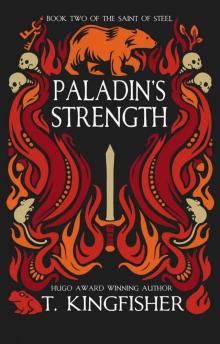 Paladin's Strength
Paladin's Strength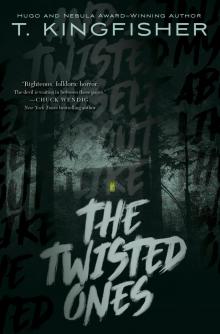 The Twisted Ones
The Twisted Ones The Hollow Places
The Hollow Places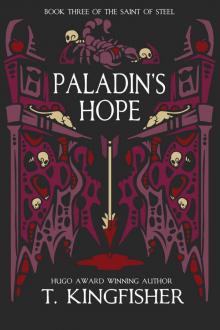 Paladin’s Hope: Book Three of the Saint of Steel
Paladin’s Hope: Book Three of the Saint of Steel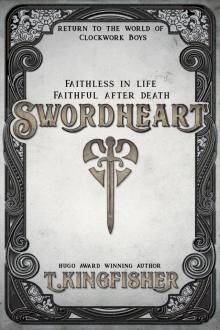 Swordheart
Swordheart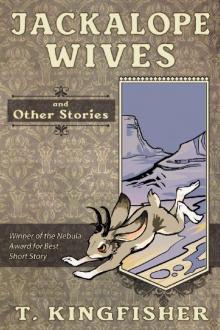 Jackalope Wives And Other Stories
Jackalope Wives And Other Stories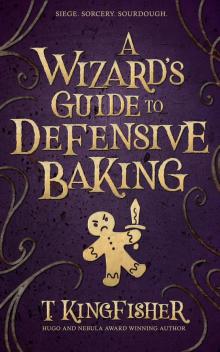 A Wizard's Guide to Defensive Baking
A Wizard's Guide to Defensive Baking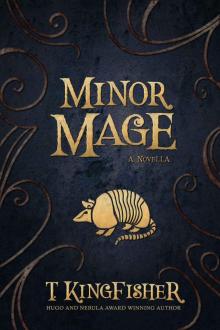 Minor Mage
Minor Mage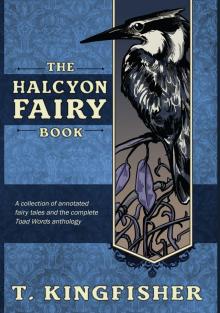 The Halcyon Fairy Book
The Halcyon Fairy Book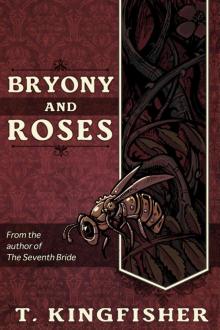 Bryony and Roses
Bryony and Roses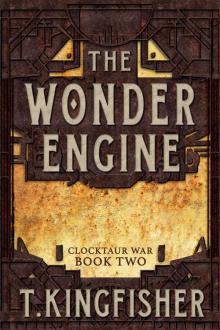 The Wonder Engine_Book Two of the Clocktaur War
The Wonder Engine_Book Two of the Clocktaur War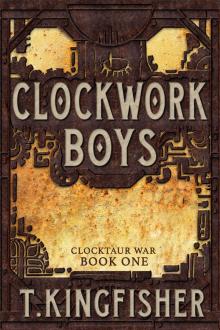 Clockwork Boys: Book One of the Clocktaur War
Clockwork Boys: Book One of the Clocktaur War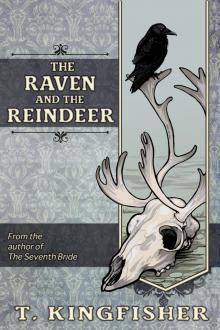 The Raven and the Reindeer
The Raven and the Reindeer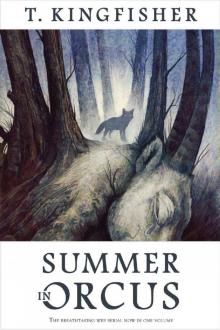 Summer in Orcus
Summer in Orcus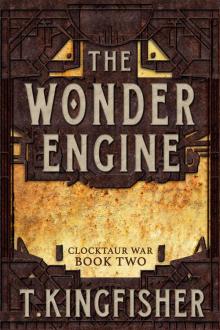 The Wonder Engine
The Wonder Engine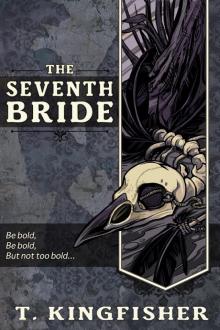 Seventh Bride
Seventh Bride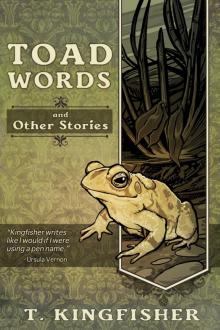 Toad Words
Toad Words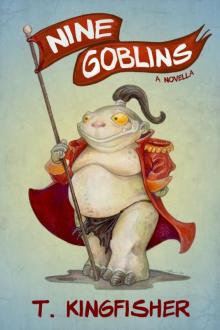 Nine Goblins
Nine Goblins